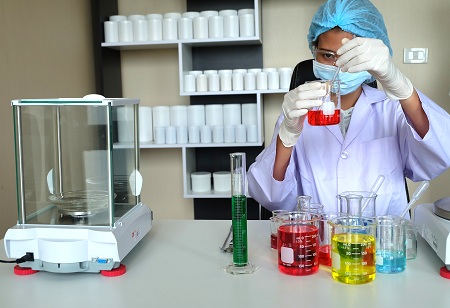One of the most promising developments in the constantly developing field of medicine is pharmacogenomics. To personalize pharmacological therapy for each patient, this cutting-edge field combines the strength of genetics and pharmacology. Pharmacogenomics has the power to transform healthcare by improving drug safety and effectiveness by adjusting a patient's course of treatment in accordance with their genetic composition.Pharmacogenomics is the scientific study of how genetic variation impacts how a person reacts to medications. Clinicians can determine which treatments are most likely to be efficient and secure for a given patient by analyzing the genetic composition of that patient. By doing so, you can lessen the chance of negative responses and the expenditures related to therapies that are ineffective. Let us now look at how pharmacogenomics may be used to improve medication safety and efficacy
Personalized Medicine: A Paradigm Shift in Healthcare
Traditionally, medicine has followed a one-size-fits-all approach, with physicians prescribing medications based on general guidelines and population-wide studies. However, this approach often fails to consider the significant genetic variation between individuals. This is where Pharmacogenomics steps in, offering a personalized approach to drug therapy.Pharmacogenomics aims to decipher how an individual's genes influence their response to drugs. It does so by identifying genetic variations that impact drug metabolism, effectiveness, and adverse reactions. By analyzing a patient's genetic profile, healthcare providers can make more informed decisions regarding drug selection, dosage, and treatment duration. This personalized approach minimizes the trial-and-error aspect of drug therapy, reducing the risk of adverse reactions and increasing the likelihood of successful treatment outcomes.For example, certain genetic variants can affect how an individual metabolizes warfarin, a commonly prescribed anticoagulant. Patients with specific genetic markers may require higher or lower doses to achieve the desired therapeutic effect without increasing the risk of bleeding or clotting. Pharmacogenomics empowers clinicians to identify such variations and prescribe the optimal dose from the start, significantly improving patient safety and treatment efficacy.“Pain management, cancer therapy, and mental health treatment are some areas that are ahead of the curve in using genomics information. With pain management, a gene involved in turning codeine into morphine can influence how much codeine will be effective in addressing a patient’s pain. Using a genetic test, providers can see if specific changes that lend themselves to modifiers in metabolism are present and consider avoiding certain forms of pain relief or choosing other, potentially safer, options based on the test results†Says Sobha Pisharody, PhD, Chief Strategy & Product Officer, InformedDNA
Reducing Adverse Drug Reactions: Saving Lives and Resources
Adverse drug reactions (ADRs) represent a significant public health concern, contributing to increased healthcare costs and patient morbidity and mortality. ADRs are often the result of unforeseen drug-gene interactions, which pharmacogenomics can help predict and prevent.Pharmacogenomic testing can identify genetic markers associated with an increased risk of ADRs, allowing healthcare providers to make more informed decisions when prescribing medications. This proactive approach not only saves lives but also reduces the economic burden of ADRs on healthcare systems.One notable example is the HLA-B5701 gene variant and its association with the hypersensitivity reaction to the antiretroviral drug abacavir. Before the advent of pharmacogenomics, patients were exposed to the risk of this severe reaction, which could be life-threatening. With pharmacogenomic testing, individuals carrying the HLA-B5701 variant can be identified and prescribed alternative medications, thus avoiding this potentially fatal ADR.In addition to improving patient safety, pharmacogenomics can lead to significant cost savings in healthcare. A study published in the Journal of Medical Economics estimated that implementing pharmacogenomic testing for one commonly prescribed medication, clopidogrel, could result in annual savings of over $1.1 billion in the United States alone by preventing ADRs and optimizing treatment outcomes.
Advancing Drug Development and Innovation
Pharmacogenomics not only enhances the use of existing medications but also plays a pivotal role in drug development and innovation. The integration of genomic data in the drug development process allows pharmaceutical companies to identify potential responders and non-responders to new drugs early in the clinical trial phase.By incorporating pharmacogenomic insights into drug development, researchers can design more targeted and effective treatments, reducing the time and resources needed for drug approval. This not only expedites the delivery of innovative therapies to patients but also increases the likelihood of successful drug development.Furthermore, pharmacogenomics contributes to the concept of "precision medicine," where treatments are tailored to the genetic make-up of patients. This approach has led to groundbreaking developments in oncology, where the identification of specific genetic mutations in cancer cells has enabled the development of targeted therapies with remarkable efficacy and fewer side effects.Personalized treatment that improves drug safety and efficacy is promised by pharmacogenomics, a ground-breaking advancement in healthcare. This ground-breaking sector enables medical professionals to prescribe pharmaceuticals with greater knowledge, lowering the possibility of negative side effects and enhancing patient results. Pharmacogenomics can save lives and lower healthcare costs by locating genetic markers linked to ADRs. Additionally, it is essential for medication creation and development, accelerating the delivery of patient-specific medicines.The potential advantages for patients and healthcare systems alike are enormous as the area of pharmacogenomics develops and is more integrated into clinical practice. The potential of pharmacogenomics cannot be overestimated, despite obstacles to be solved, such as guaranteeing equal access to testing and managing the integration of genetic data into healthcare systems. We are unlocking the promise of pharmacogenomics to usher in a new era of healthcare that is truly individualized, safer, and more efficient thanks to ongoing research and technological breakthroughs.
